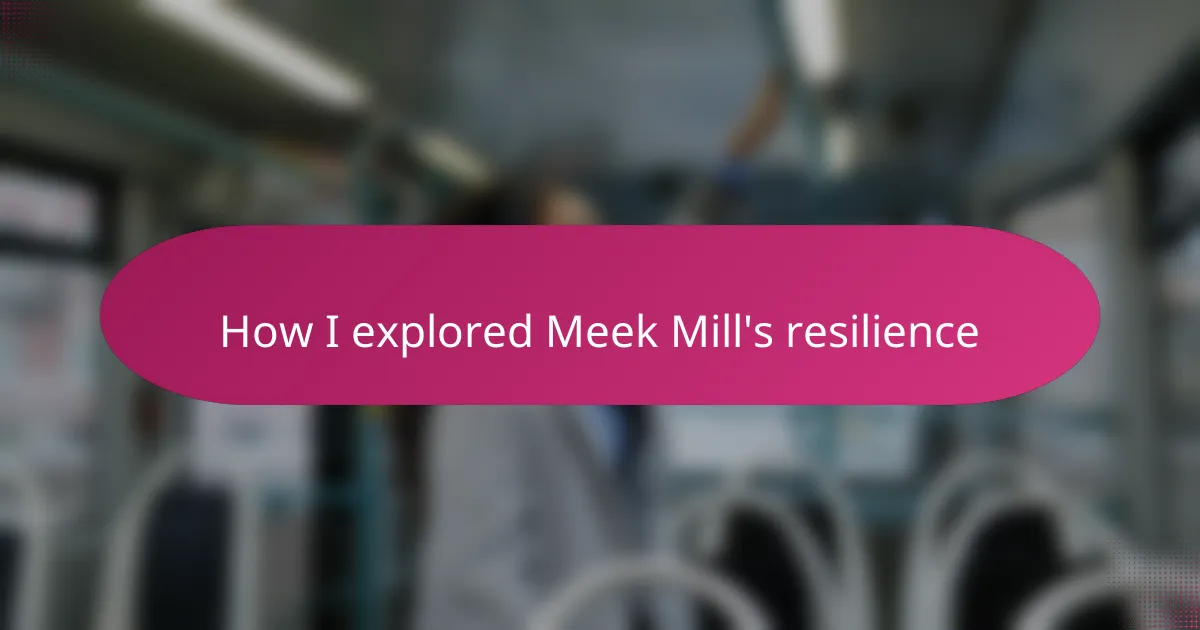Key takeaways
- Resilience in rap music enables artists to transform personal hardships into powerful messages, fostering a deep connection with listeners.
- Meek Mill exemplifies resilience as he channels his struggles into his music and advocacy, showcasing the importance of authenticity and perseverance.
- Setbacks can serve as catalysts for growth, allowing artists like Meek to turn challenges into motivation for both themselves and their audience.
- Embracing vulnerability and authenticity in one’s creative journey can profoundly impact both personal growth and listener connection.
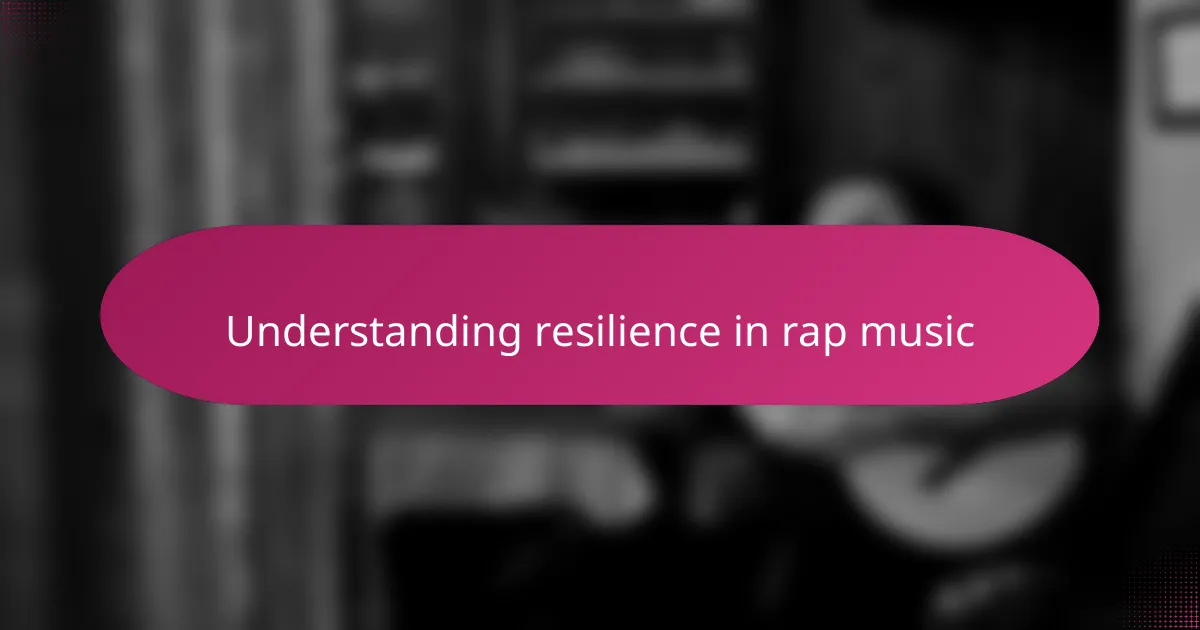
Understanding resilience in rap music
Resilience in rap music isn’t just about bouncing back; it’s about surviving the storm and turning pain into power. I’ve noticed how many artists like Meek Mills channel their struggles, whether from street life or legal battles, into lyrics that resonate deeply. Have you ever felt that raw honesty in a track that makes you nod your head in understanding, like the artist is speaking your story?
What strikes me most is how resilience takes many shapes—it’s not just physical endurance, but emotional strength, too. When I listen closely, I hear the layers of frustration, hope, and determination woven into verses that reflect real-life battles. Isn’t it incredible how rap turns personal hardship into something almost universal, connecting artist and listener through shared resilience?
Sometimes, I wonder if resilience is the silent hero of rap music—a quality that doesn’t always get the spotlight but forms the foundation of every meaningful rhyme. For me, understanding this helps appreciate rap beyond beats and hooks; it’s about recognizing the human spirit fighting to be heard and acknowledged. How often do we pause to think about the courage behind those verses?
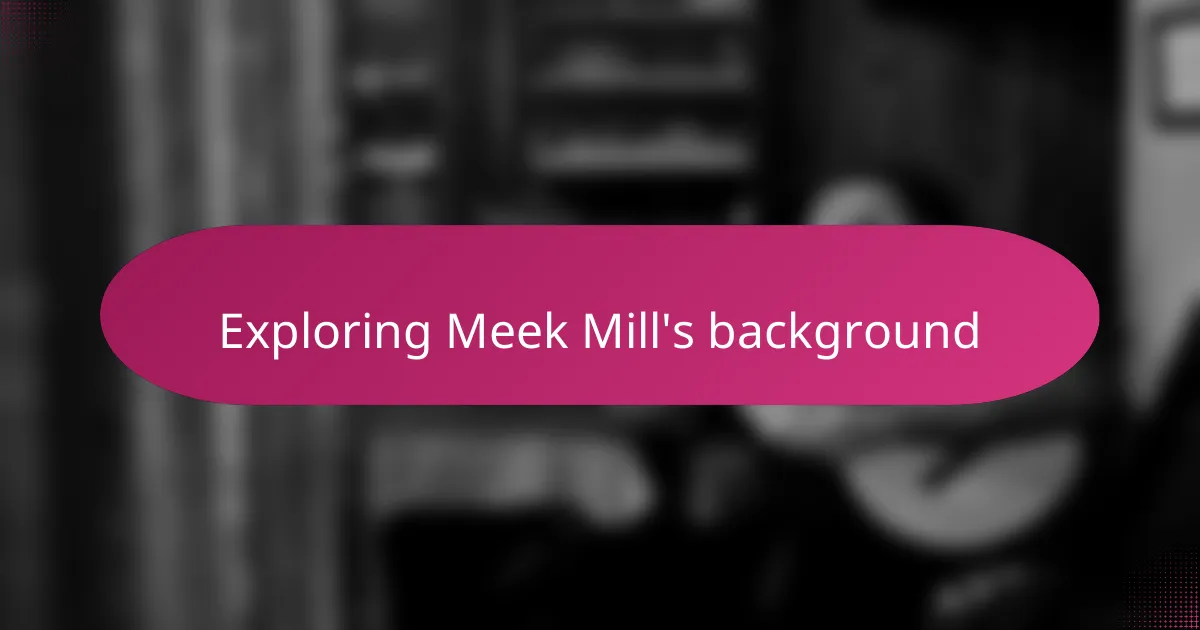
Exploring Meek Mill’s background
Meek Mill’s background is a powerful story that shapes everything in his music. Growing up in Philadelphia, he faced tough streets and constant struggles that could have easily broken someone’s spirit. I find it fascinating how those early experiences didn’t just harden him—they fueled his drive to tell his truth through rap.
What’s particularly striking to me is how Meek’s upbringing wasn’t just about hardship; it was about community and survival. His lyrics often paint vivid pictures of life in neighborhoods where hope feels scarce, yet he manages to spotlight resilience amid chaos. Have you ever wondered how someone transforms pain from their past into an unshakable will to succeed? That’s what Meek exemplifies.
From my perspective, understanding Meek Mill’s background helps me grasp why his music hits so hard emotionally. It’s not just a story of adversity; it’s a testament to relentless perseverance. When I listen to his tracks, I don’t just hear a rapper—I hear a person who refused to be defined by his circumstances. Isn’t that the kind of resilience we all secretly admire?
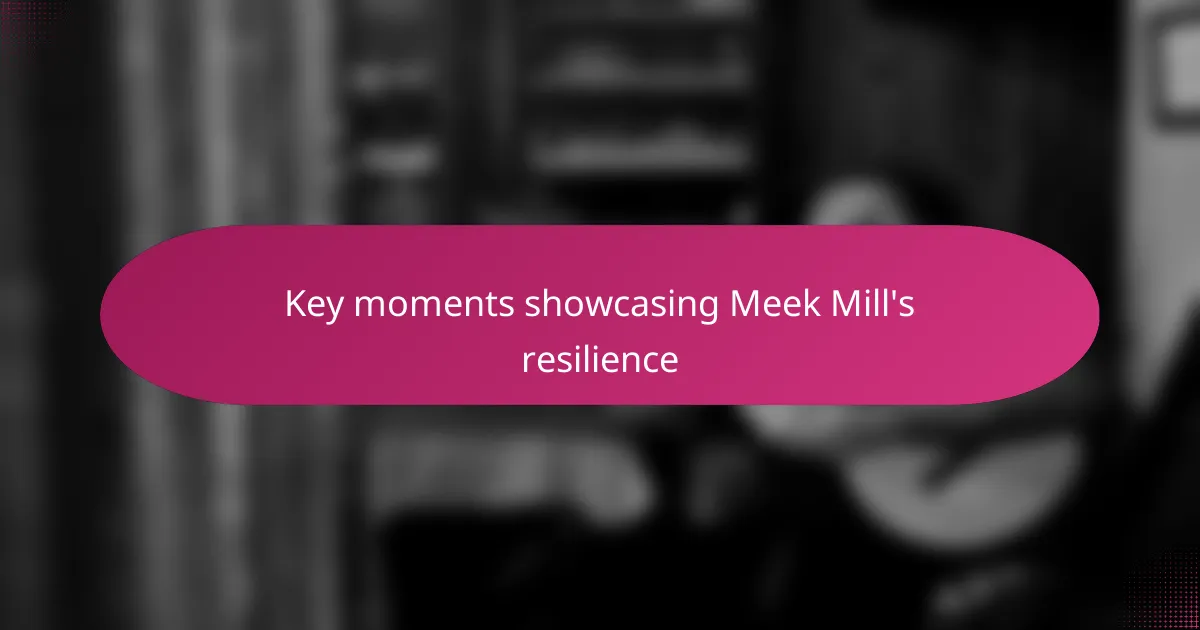
Key moments showcasing Meek Mill’s resilience
One moment that really stood out to me was Meek’s public battle with the criminal justice system. Watching him face years of legal challenges, and yet keep releasing hit music and speaking out about reform—it showed me a kind of resilience that’s more than toughness; it’s courage. Have you ever faced a situation where the odds seemed stacked against you, but you kept pushing anyway? That’s the kind of strength I see in Meek.
Then there’s the way he bounced back after public setbacks, like the controversies around his probation. Instead of letting those moments break him, Meek used them to amplify his message. It made me think about how setbacks can be a springboard if you don’t let them define you. Isn’t it inspiring when someone turns their lowest points into motivation?
Another instance that really stuck with me was Meek’s evolution in using his platform to uplift others, especially during times of personal struggle. I remember feeling a deep connection when I heard him speak about hope and change despite everything he’s been through. It’s proof, in my experience, that resilience isn’t just surviving—it’s transforming pain into a force that inspires others to keep going.
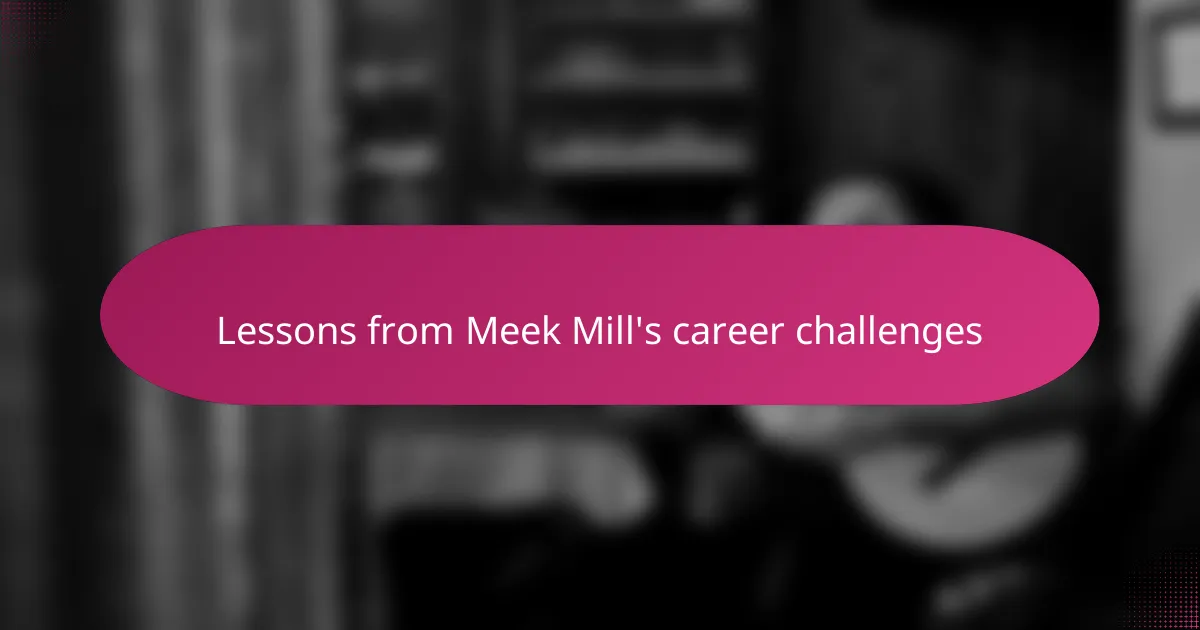
Lessons from Meek Mill’s career challenges
What I’ve learned from Meek Mill’s career challenges is that resilience isn’t just about enduring hardship—it’s about using those moments to grow stronger. When Meek faced legal battles and public scrutiny, instead of shrinking back, he doubled down on his art and advocacy. Have you ever found that the toughest times sometimes bring out your fiercest determination? That’s the kind of lesson Meek teaches me.
Another thing that really hits me is how Meek turns setbacks into catalysts for change. Instead of letting failures define him, he channels them into his music and activism. It reminds me that setbacks don’t have to be the end of the story but can be the starting point for a new chapter. Isn’t that a powerful mindset we can all learn from?
Finally, observing Meek’s journey has shown me how important it is to stay authentic through challenges. Even when the noise gets loud, Meek’s commitment to speaking his truth has never wavered. It makes me think: How often do we silence ourselves in difficult times, and what if, like Meek, we used our voices to inspire not just ourselves but others too?
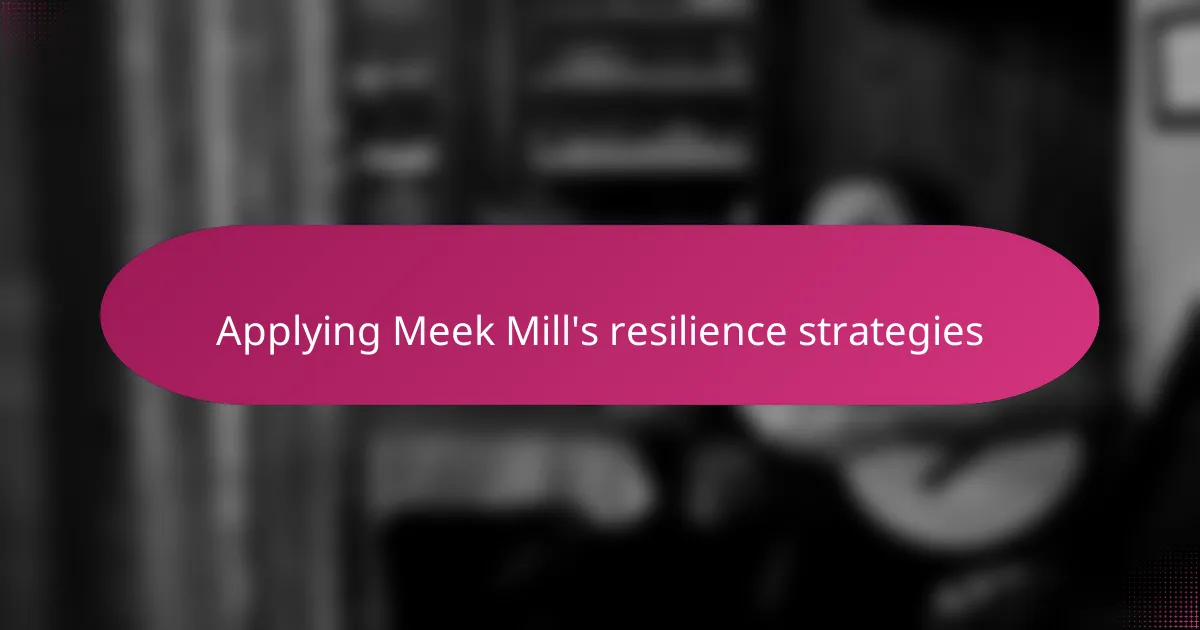
Applying Meek Mill’s resilience strategies
Applying Meek Mill’s resilience strategies in my own life has been about embracing challenges head-on rather than avoiding them. I’ve learned from him that setbacks aren’t roadblocks but opportunities to grow stronger and find new ways forward. Have you noticed how, when you stop resisting difficulties and start leaning into them, clarity and strength begin to emerge?
What really resonates with me is Meek’s unwavering commitment to speaking his truth, no matter the opposition. It takes courage to be authentic when the world is quick to judge, and that’s a lesson I try to carry with me daily. How often do we hold back our true voices out of fear, only to realize later how liberating and powerful honesty can be?
I also find that transforming personal pain into motivation, just like Meek does in his music and activism, is one of the most profound resilience strategies. It’s not about ignoring hardship but about using it as fuel to inspire change. When life throws its worst, what if we could channel that energy into something greater, something that can move not just ourselves but those around us?
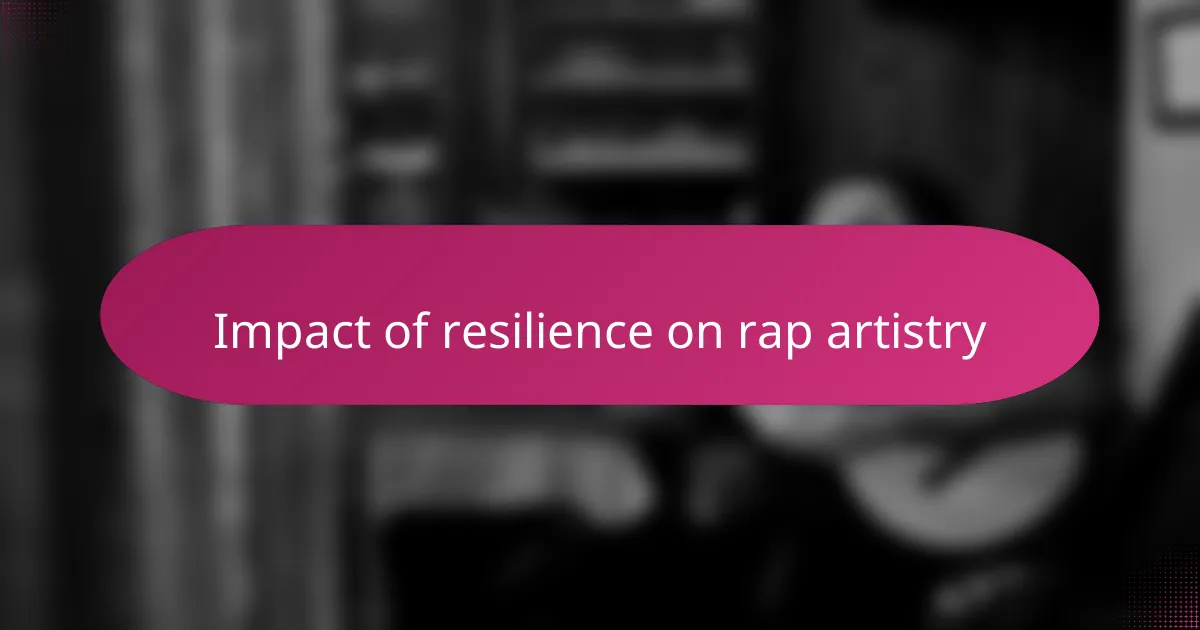
Impact of resilience on rap artistry
Resilience shapes rap artistry by infusing authenticity into every line. From my experience, when an artist channels true struggle into their music, it creates a connection you can feel—like the artist is inviting you to witness their strength. Isn’t that vulnerability what transforms a song into a powerful story?
I’ve often thought about how resilience influences creativity itself. Instead of limiting expression, it pushes rappers to dig deeper, crafting lyrics that aren’t just catchy but carry emotional weight. Have you ever noticed how the toughest moments in an artist’s life often lead to their most compelling tracks?
Resilience also serves as a lens through which artists view their craft with renewed purpose. For me, seeing rappers like Meek Mill use setbacks as fuel rather than barriers highlights how resilience turns challenges into motivation—not just for the artist, but for everyone listening. What’s more inspiring than witnessing someone rise and rewrite their narrative through music?
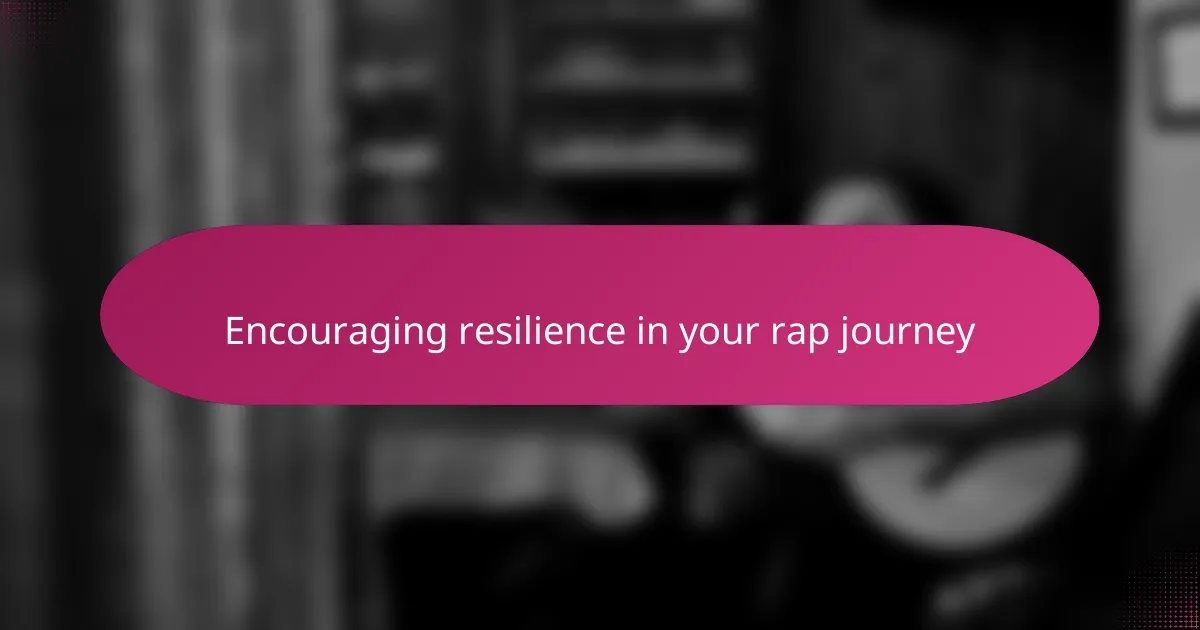
Encouraging resilience in your rap journey
Encouraging resilience in your rap journey means embracing those moments when the world pushes back hardest. I remember early on, facing rejection after pouring my heart into verses—it felt like an endless grind. But reflecting on artists like Meek Mill, I’ve realized that resilience isn’t just about endurance; it’s about finding the strength to keep creating even when the spotlight dims.
Another thing that’s helped me stay resilient is leaning into authenticity, no matter how raw or uncomfortable it feels. Have you ever noticed how the most impactful rap tracks come from a place of real struggle and honesty? That level of vulnerability not only builds your creative voice but also connects you deeply with listeners who need to hear your story.
Finally, resilience in your rap journey thrives when setbacks become your fuel. I’ve often asked myself, what if I treated obstacles not as failures but as stepping stones? Following Meek’s example, transforming pain and criticism into motivation has been a game-changer—turning every challenge into a new lyric, a new beat, a new chapter worth sharing.
